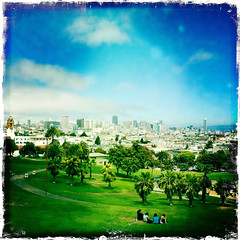Obviamente, me encantaría regresar a Buenos Aires, la ciudad de México o Madrid -- o viajar a otra ciudad del mundo hispanoparlante -- para continuar aprendiendo la lengua que a mí me parece que nunca voy a dominar como quiero. Cada día me despierto con muchísimas ganas de hacerlo, pero no es posible. Pero se me ocurrió una idea sencilla: ¿por qué no trato de pasar un día entero en español justo donde estoy? Pero de verdad; tendría que escoger un día en que no haría necesidad de comunicar con nadie en inglés.
Lo que trataba de hacer en el DF durante los días en que no tenía que trabajar se puede replicar aquí en San Francisco (o en cualquier ciudad) más o menos facilmente si uno tiene ganas. Les comparto con ustedes algunas ideas:
- Mirar televisión por internet (enlace)
- Limitar TV 'offline' a Telemundo, Univision, etc. (aún mejor si aprovechan de los subtítulos en español)
- Ver peliculas en español via Netflix o DVD (con subtítulos en español si posible)
- Leer noticias de sitios web del mundo hispanoparlante
- Pasar por un vecindario donde hay mucha gente latina, pidiendo cafecitos o almuerzo en espanol
- Claro, mientras viajan al barrio, pueden escuchar música en español por iPhone/iPod (enlace)
- Charlar con amigos que hablan español o, si todos los amiguitos son gringos, se puede hacer el experimento durante un día en que hay un meetup de hablantes de español (enlace)
Y después de cumplir la misión, ¿por qué no describen la experiencia en un post (en español, por supuesto, aunque a lo mejor deben traducirlo para los gringos)?
Obviously, I'd love to return to Buenos Aires, Mexico City or Madrid -- or travel to another city in the Spanish-speaking work -- to continue learning the language that it seems like I'll never dominate the way I want to. Every day I wake up really wanting to do this, but it's just not possible. But a simple idea occurred to me: why don't I try to spend an entire day in Spanish exactly where I am? But for real; I'd have to choose a day when I wouldn't have to communicate with anyone in English.
What I tried to do in Mexico City during the days when I didn't have to work can be replicated here in San Francisco (or any other city) relatively easily if one is up for it. I'll share a few ideas:
- Watch TV programming via internet
- Limit offline TV to Telemundo, Univision, etc. (even better if you can take advantage of Spanish subtitles)
- Watch movies in Spanish via Netflix or DVD (with Spanish subtitles if that's an option)
- Read news from websites from the Spanish-speaking world
- Hang out in a neighborhood where there are a lot of Latinos, ordering your coffee or lunch in Spanish
- Of course, while traveling to the area, you can listen to music in Spanish on your iPhone/iPod
- Chat with friends who speak Spanish or, if all your friends are gringos, you can do the experiment during a day when there's a meetup of Spanish-speakers
And after completing the mission, why not describe the experience in a post (in Spanish, of course, although perhaps you should translate it for aforementioned gringos)?

